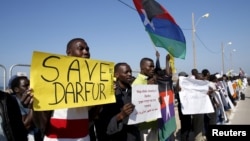Sudan's Foreign Ministry summoned the U.S. charge d'affaires in Khartoum on Wednesday over Washington's sponsorship of a draft U.N. Security Council resolution extending sanctions related to the Darfur conflict and adding restrictions on gold mining, Sudan's main source of income.
A 2005 Security Council resolution placed a travel ban and asset freeze on those "impeding the peace process" in Darfur and established the U.N. panel of experts mandated to monitor the arms embargo on Darfur.
The U.S. draft extending the resolution included "unfair clauses" on gold mining in Sudan, the Foreign Ministry said.
Gold has been the main source of income in Sudan since it became an oil importer when South Sudan seceded in 2011. The new nation took with it three-quarters of Sudan's oil output, the main source of foreign currency used to support the Sudanese pound and to pay for food and other imports.
"The draft resolution contradicts the general spirit of bilateral relations between the two countries, especially in light of the U.S. envoy's recent visit to Sudan and the meeting of the foreign minister with President [Barack] Obama in Addis Ababa and with U.S. Secretary of State John Kerry," the statement said.
Fighting in Darfur escalated in January when an unidentified group attacked a village, displacing large numbers of residents to a nearby town where they held protests that led to the closure of local business and schools.
The recent bout of fighting has displaced 37,000 people, the U.N. said. The Sudanese army said it defeated one of the main rebel groups in the Jebel Marra region, where the recent fighting has been concentrated, and now controls the area and has opened main roads.
The Darfur conflict erupted in early 2003 when mostly non-Arab tribes took up arms and accused the Arab-dominated Khartoum government of neglect.
The government retaliated by arming mainly Arab militia, known as Janjaweed, but Khartoum said it was not responsible for their campaign of murder, rape, arson and plunder that has driven 2 million villagers into squalid camps.
According to the United Nations, as many as 300,000 people have been killed in Darfur, some 4.4 million people need aid and more than 2.5 million have been displaced. Although the killings have eased, the insurgency continues and Khartoum has sharply escalated attacks on rebel groups over the past year.








